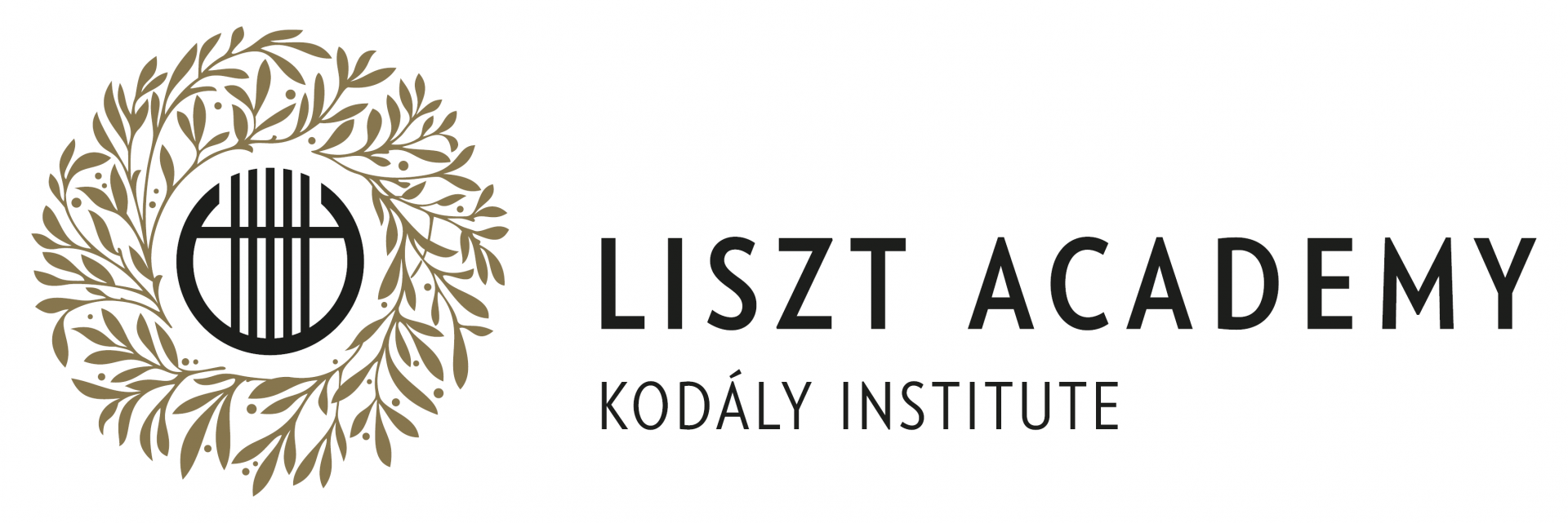Compositions
Zoltán Kodály's earliest compositions date from the 1890s and his last were composed in 1966. During this long and productive life he created hundreds of compositions in a variety of media and genres. His style was profoundly influenced by his collecting and study of Hungarian folk music and by the works of Debussy.
Most of Kodály's works are published by Universal Edition, Boosey & Hawkes, and Editio Musica Budapest and the CDs by Hungaroton.
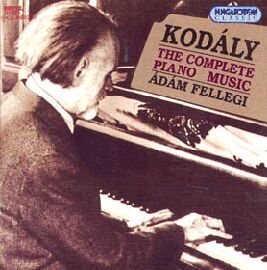
| 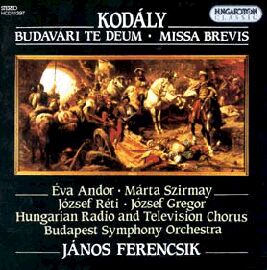
| 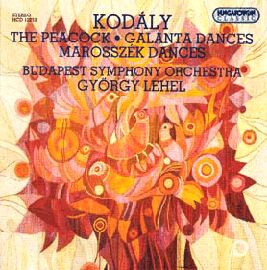
| 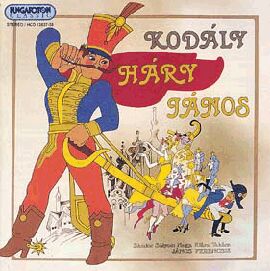
|
Among Kodály's compositions are:
STAGE WORKS
Háry János, Op. 15 (1926)
Székely Fonó (The Spinning Room) (1924-32)
ORCHESTRAL WORKS
Summer Evening (1906), Revised (1929)
Variations on a Hungarian Folksong 'Fölszállott a páva' [Peacock] (1939)
Dances of Marosszék (1930) [also for piano solo]
Dances of Galanta (1933)
Concerto for Orchestra (1939-40)
Symphony (1930s-1961)
UNACCOMPANIED CHORAL WORKS
Approximately 147 works:
24 for a cappella male chorus
45 for mixed chorus
78 for children's and women's choruses
Educational compositions (333 Singing Exercises, Bicinia Hungarica I-IV,
Tricinia, 77/66/55/44/33/22 Two-Part Singing Exercises, etc.)
ACCOMPANIED CHORAL WORKS
Psalmus hungaricus, Op. 13 (1923)
Five Tantum ergo (1928)
Pange lingua (for mixed voices (1929)
Te Deum of Budavár (1936)
Laudes organi (1966)
CHAMBER WORKS
Intermezzo for String Trio (1905)
First String Quartet, Op. 2 (1908-9)
Sonata for Cello and Piano, Op. 4 (1909-10)
Duo for Violin and Cello, Op. 7 (1914)
Second String Quartet, Op. 10 (1916-March 1918)
Serenade for Two Violins and Viola, Op. 12 (1919-March 1920)
SOLO INSTRUMENTAL WORKS
Solo Cello Sonata, Op. 8 (1915)
Prelude (for organ) (1931) (orig. for choral work Pange lingua)
MASSES
Organ Mass (1942)
Missa brevis (organ version-1942; orchestral version-1948)
SONGS
Four Songs for Voice and Piano (1907-1917)
Sixteen Songs on Popular Words for Voice and Piano, Op. 1 (1907-1909)
Two Songs for Voice and Orchestra, Op. 5 (1913-1916) [also in piano score]
Belated Melodies, Op. 6 (Seven Songs for Voice and Piano) (1912-1916)
Five Songs, Op. 9 for Voice and Piano (1915-1918)
Three Songs, Op. 14 for Voice and Piano (1918-1923)
Himfy Song for Voice and Piano (1925)
Epitaphium Joannis Hunyadi for Voice and Piano (1965)
Unaccompanied Choral Works
24 compositions for a cappella male chorus:
A csikó (The Filly)
A franciaországi változásokra (To the Changes in France)
A magyarokhoz (Song of Faith)
A nándori toronyőr (The Tower Watchman of Nándor)
A szabadság himnusza - La Marseillaise
Bordal (Drinking Song)
Emléksorok Fáy Andrásnak (In András Fáy's Album)
Esti dal (Evening Song)
Élet vagy halál (Life or Death)
Ének Szent István királyhoz (Hymn to St Stephen)
Felszállott a páva (The Peacock)
Hej Büngözsdi Bandi (Hey, Bandi Büngözsdi)
Huszt (The Ruins)
Isten csodája (God's Mercy)
Jelenti magát Jézus (The Voice of Jesus)
Jelige (Epigraph)
Justum et tenacem - Rendületlenül (Justum et tenacem - Resolutely)
Karádi nóták (Songs from Karád)
Katonadal (Soldier's Song)
Kit kéne elvenni (The Bachelor)
Mulató gajd (Drinking Fellow)
Nemzeti dal (National Song)
Rabhazának fia (The Son of an Enslaved Country)
Semmit ne bánkódjál (Cease your Bitter Weeping)
45 compositions for mixed chorus:
Adventi ének - Veni, veni Emmanuel (Advent Song)
Akik mindig elkésnek (Too Late)
A magyar nemzet (The Hungarian Nation)
A magyarokhoz (Song of Faith)
An Ode for Music (Óda a muzsikához)
A szabadság himnusza - La Marseillaise
A 121. genfi zsoltár (Geneva Ps cxxi)
A székelyekhez (To the Transylvanians)
A szép énekszó múzsájához - Horatii Carmen (To the Muse of Beautiful Singing)
Az éneklő ifjúsághoz (To the Singing Youth)
Az 50. genfi zsoltár (Geneva Ps l)
Balassi Bálint elfelejtett éneke (The Forgotten Song of Bálint Balassi)
Békesség-óhajtás (Wish for Peace)
Cohors Generosa - Régi magyar diákköszöntő (Hungarian Students' Song)
Csatadal (Battle Song)
Első áldozás (Communion Anthem)
Este (Evening)
Ének Szent István királyhoz (Hymn to St Stephen)
Felszállott a páva (The Peacock)
Gömöri dal (Gömör Song)
Gyászének - I Will Go Look for Death
János köszöntő (Greeting to St John)
Jelige (Epigraph)
Jézus és a kufárok (Jesus and the Traders)
Köszöntő (Greeting)
Liszt Ferenchez (To Franz Liszt)
Magyarország címere (The Arms of Hungary)
Mátrai képek (Mátra Pictures)
Media vita in morte sumus
Mohács
Molnár Anna (Annie Miller)
Naphimnusz (Adoration)
Norvég leányok (Norwegian Girls)
Öregek (The Aged)
Pange lingua
Sík Sándor Te Deuma (Te Deum of Sándor Sik)
Sirató ének (Dirge)
Székely keserves (Transylvanian Lament)
Szép könyörgés (Beseeching)
Túrót eszik a cigány (See the Gypsies Munching Cheese)
Zrínyi szózata (Hymn of Zrínyi)
78 compositions for children's and women's choirs:
A csikó (The Filly)
A juhász (The Shepherd)
A leányka szótalan (The Girl Without A Word)
A magyarokhoz (Song of Faith)
Angyalkert - Játékdalok (Garden of Angels)
Angyalok és pásztorok (The Angels and the Shepherds)
Arany szabadság - Aurea Libertas (Golden Liberty)
A süket sógor (The Deaf Boatman)
A 150. genfi zsoltár (Geneva Ps cl)
A szabadság himnusza - La Marseillaise
Ave Maria
Az éneklő ifjúsághoz (To the Singing Youth)
Árva vagyok (Orphan am I)
Bent a bárány (The Lamb is In)
Békedal (Song of Peace)
Chi d'amor sente
Chi vuol veder
Cigánysirató (Gypsy Lament)
Ciróka
Cú föl, lovam (Arise, my Horse)
Csalfa sugár (False Spring)
Dal (Fancy)
Egyetem, begyetem (Hippity, Hoppity)
Esti dal (Evening Song)
Ének Szent István királyhoz (Hymn to St Stephen)
Éva, szívem, Éva (Eva, My Love, Eva)
Falu végén (In the Village)
Fior scoloriti
Fuor de la bella caiba
Fürdő után (After the Bath)
Gergely-járás (St Gregory's Day)
Gólya-nóta (The Swallow's Wooing)
Gyertya-játék (Candle Game)
Hajnövesztő (Grow, Tresses)
Harangszó (Bells)
Harmatozzatok! (Dewdrops)
Harasztosi legénynek (For the Lad of Harasztos)
Hat tréfás kánon (6 Humorous Canons)
Három gömöri népdal (3 Folksongs from Gömör)
Házasodik a vakond (The Mole's Wedding)
Hegyi éjszakák I-V (Mountain Nights I-V)
Héja (Falcon)
Hét könnyű gyermekkar (7 Easy Children's Choruses)
Isten kovácsa (God's Blacksmith)
Jelenti magát Jézus (The Voice of Jesus)
Jelige (Epigraph)
Jó gazd' asszony (The Good Wife)
Karácsonyi pásztortánc (Shepherds' Christmas Dance)
Katalinka (Ladybird)
Kár! (Sorry!)
Kecskejáték (Goat Dance)
Két zoborvidéki népdal (2 Folksongs from Zobor)
Lencse, borsó, kása (Lentils, Beans, and Buckwheat)
Lengyel László (King László's Men or Magyars and Germans)
Madarak voltunk (We Were Birds)
Meghalok, meghalok (Woe is Me)
Méz, méz, méz (Honey, Honey, Honey)
Mikor mentem misére (As I Went to Mass)
Nagyszalontai köszöntő (A Birthday Greeting)
Négy olasz madrigál - Quattro Madrigali (4 Italian Madrigals)
Nyulacska (The Leveret)
Piros alma mosolyog (Blooming on the Hilltop)
Pünkösdölő (Whitsuntide)
Semmit ne bánkodjál (Cease your Bitter Weeping)
Szent Ágnes ünnepére (The Feast of St Agnes)
Szolmizáló kánon (Solfa Canon)
Táncnóta (Dancing Song)
Túrót eszik a cigány (See the Gypsies Munching Cheese)
Tyúkkergető (Hen Chasing)
Tyúkozás (Hen Game)
Új esztendőt köszöntő (A Christmas Carol)
Ürgeöntés (The Gopher)
Vásárosdi (Market Game)
Versengés (Competition)
Villő (The Straw Guy)
Vízkereszt (Epiphany)
Zöld erdőben (In the Green Wood - 'Mid the Oak Trees)


